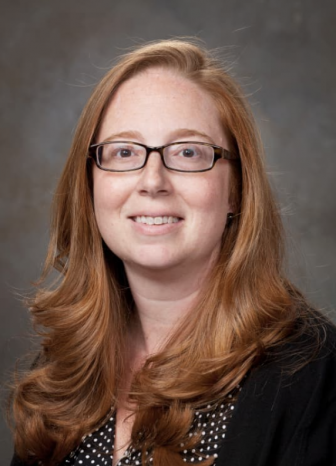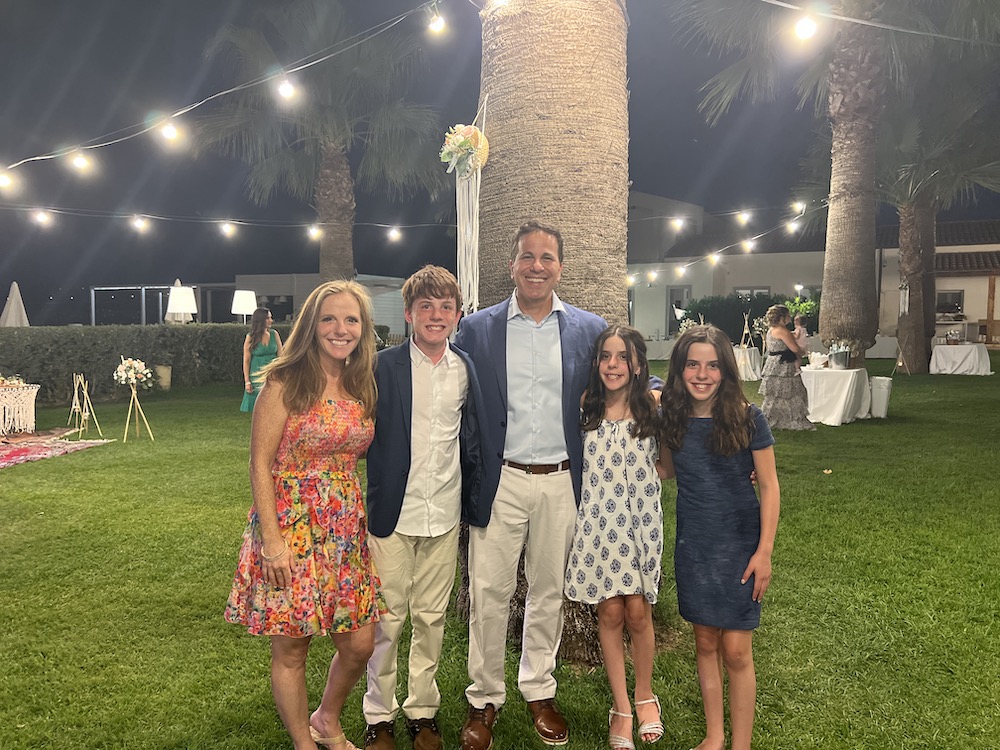The returning New Canaan Combine—an athletic competition between the New Canaan Police and Fire Departments that also brings in community members to fundraise for a good cause—this year will benefit the Gracie Fund for Pediatric Cancer. That nonprofit organization, named for a local family’s 12-year-old daughter who was diagnosed with leukemia last year and is undergoing treatments, was created following talks with one of her caregivers, Yale New Haven Hospital and Yale School of Medicine’s Dr. Stephanie Massaro.
We spoke to Massaro on Sunday. Here’s a transcript of our conversation.
***
New Canaanite: Thank you for carving out some time to talk to me about the Gracie Fund.

Dr. Stephanie Massaro
Dr. Stephanie Massaro: My pleasure.
Before we start talking about your connection here to New Canaan with the Falsettas, could you please, for our readers, just tell us what it is you do and how you came to know the Falsetta family?
I am a pediatric hematologist, oncologist and palliative care provider at Yale New Haven Children’s Hospital. I’m an associate professor of Pediatrics at Yale University School of Medicine. I’ve been at Yale now since 2006, so I guess 17 years. I am now the director of the Pediatric Leukemia and Lymphoma Program as well as the Palliative Care Program. I’m the medical director for Pediatric Hematology Oncology at Yale New Haven Children’s Hospital. So I wear several different hats in the hospital. And in my role as leukemia provider, I met Grace and her family.
And so we heard from Gracie’s dad, Chris, that you, Dr. Massaro, were helpful in identifying needs for kids undergoing treatment and their families. So can you tell us a little bit about what’s already in place in terms of services for those individuals, and also what are some of the areas that the Gracie Fund is designed to address?
So I think in Connecticut, there are two academic institutions, Yale University, School of Medicine,and Yale New Haven Children’s Hospital, and then Connecticut Children’s Medical Center and its affiliation with University of Connecticut Medical School. These two academic institutions take care of all of the children in our state who have pediatric malignancies, blood disorders, nonmalignant blood disorders. And I think there are a handful of patients in Connecticut who end up seeking care in our neighboring states, either in New York or potentially in Massachusetts. Because we are a relatively small state, there are a lot of initiatives to help support children with cancer in the community. there’s a lot of not for profit organizations that come from the grassroots efforts of families to be able to give back, particularly after they’ve had a similar experience to the Falsettas, with a child being ill. That said, there’s some overlap and there’s some absence. A lot of funds will help support families in the sense that one parent has to stop working, or in the sense of a single parent household, which can be financially devastating. And so a lot of organizations will try to fill in the gaps, provide financial support to make rent or car payment. Other organizations will see to the more targeted needs of children in terms of making sure they have what they need for the holidays and birthday celebrations and filling in the gaps in the absence of school and interactions with peers, giving opportunities for connection while they’re in hospital. And so there are a number of programs throughout our state that assist from the perspective of quality of life and getting through this portion of their care. There are also organizations that attempt to provide respite for families, to try to return them to a typical well state of a family of four or five and their normal activities—for example, on a weekend, seeing a baseball game. So there’s a lot of effort in our community, thankfully, to support children and their families who unfortunately were diagnosed with cancer. I think the Gracie Fund has come out of a similar want to support children with cancer and chronic illness who are struggling in one way or another, and I don’t think it necessarily has to do with financial resources. I think it has to do with representing our effort to really tend to quality of life. And I think that’s where the intersection of palliative care and oncology care for children come together, is recognizing sort of some of the things that many of us take for granted—like making sure we have all the medicines we need and that our medicines are organized so that we do our best to get our medicines in on a daily basis on time, there are no missed doses—and so that is one of the areas of interest that Chris and the Gracie Fund have shown in terms of supporting children and their families with simple medication management strategies, because we know particularly with pediatric leukemia—acute lymphoblastic leukemia, specifically—that medication compliance largely impacts outcome. And so, if children, particularly in the maintenance phase of chemotherapy, forget to take their daily medications, their risk of disease recurrence goes up. And so, it’s a targeted area because there’s a lot of variability in children’s ability to comply. And that is related to age and resources. And within the group of resources, and of course, influenced by age. is their family structure, their guardianship, and so any strategy we can embark on to help improve medication compliance will Inevitably impact our patients overall survivals and outcomes. Event-free survivals, overall survivals, and total outcomes. And so that’s an area that Chris is particularly interested in supporting. Another area that I think directly impacts quality of life is, uh, opportunities to provide relaxation and respite—massage therapy, Reiki therapy, aromatherapy, hypnotherapy. So some of the integrative medicine approaches that we tend to forget about for children, Chris and the Gracie Fund have been willing to support. It’s tricky post-COVID with some of the direct contact and who’s ready to have a massage and who’s not, who might be ready to go to a yoga class and who’s not. I think we’re emerging from the pandemic and folks are ready to get back to some of the way life was before. I think there are pretty focused efforts to bring these kinds of services for those interested in the medical oncology world, because as adults we can choose if that’s the right fit for us, but as a whole we kind of neglect integrative medicine for children. And so I think an area that needs attention, I’ll say, is integrative medicine for pediatric patients. And I think we’re starting with massage therapy and hopefully we can do some hypnotherapy training for our providers. At some institutions, children get through pretty painful procedures without sedation using hypnotherapy. So I think there’s a lot of opportunity to improve patient experience, reduce stress and anxiety in what are inevitably incredibly stressful and anxiety provoking clinic visits or hospital visits. And so the Gracie Fund has committed to trying to help expand that in this community. And that’s a largely unmet need.
Let me ask you this then: As the physician who’s sort of on the ground, how are you feeling about the prospect of The Gracie Fund launching and seeing to it that some of these services are provided to pediatric patients.
So I’m thrilled that Chris has been able to put this much energy into the Gracie Fund. I often counsel families, you know, to make sure they are focusing on their child and the things they need to do. And he shared with me, and I don’t think it’s a secret, but this is sort of how he feels he can be productive in the face of, you know, a really difficult situation. The community is going to benefit from his efforts directly and I am incredibly grateful for The Gracie Fund, the Falsetta Family and New Canaan, and all of the people who are coming out to support the Gracie Fund, whether it’s the Combine, or through their personal relationships, potentially professional relationships that Gracie, Chris, Bridge have been able to form in coming out of what is a trying situation. I think my goal is to help him and the fund see to those kinds of unmet needs. And he and I have chatted quite a bit about how he would like to best move forward with this. And I think it’s probably going to be beneficial, for as much as I can give guidance about unmet needs for him to help choose where he’d like some of these financial efforts and support to go to, because everyone of my partners could list an unmet need for their patient population. So we want to be able to reach as many children and their families as we can. And I’m thrilled to be able to start to think about how to approach that. And these are things I haven’t been able to tackle because I haven’t had the resources. So him and the fund providing resources and assistance and bringing attention—just general attention to pediatric cancer, pediatric cancer treatment, the effects on the child, the effects on the family—is remarkable and something that we are always trying to do. And it’s September and Childhood Cancer Awareness, so it’s very timely.
Dr. Massaro, I’m going to put you on the spot a little bit, understanding how busy you are. The Combine is to be held in New Canaan on Sunday, October 1st. Is there any chance that members of the community are going to have a chance to, to meet you there?
Absolutely. Hands down, I’ll be there. I was just double checking my calendar last night, as a matter of fact, to make sure that my children don’t have conflicting sports. I will definitely be there. I have very near and dear childhood friends who live in the New Canaan community who will also be there. I’m looking forward to seeing them. I have friends who grew up here in Connecticut that are coming from afar, so to speak, to be able to join them and be at the Combine. So I will absolutely be there. I’m hoping I can get some of my partners and trainees, who have also taken care of Grace to join us as well, but I can’t promise that because I don’t know their schedules yet.
Well, that’s terrific. I would say, I guess on behalf of the community, thanks for all that you do, and especially for teaming up with our local Falsetta family in New Canaan to help shape the Gracie Fund. Before I let you go, is there anything else that you’d like to say about Grace, about the Fund, or, or the work ahead?
I think Grace is absolutely fabulous and it was a pleasure—I think, across my time knowing her. I hadn’t met Bella—and so just recently I got to meet Bella as well, and that was very exciting for me because I’ve heard tons about her. Grace and my daughter are the same age, so it’s great to hear that she’s reengaging in school and looking forward to being productive in social activities and engagements, and I think it’s really great that she see all of these efforts to support her and other children like her. And I’m grateful to the Falsetta family, the Gracie Fund, the Combine for doing this work. And I look forward to a long and productive partnership because parents, the insight of parents and what other parents need, is irreplaceable.


Wow is Dr. Massaro impressive. Can’t wait for The NC combine Oct 1; such an important (and fun) event.
Support the Gracie Fund — click on my name for a fun auction & great cause.